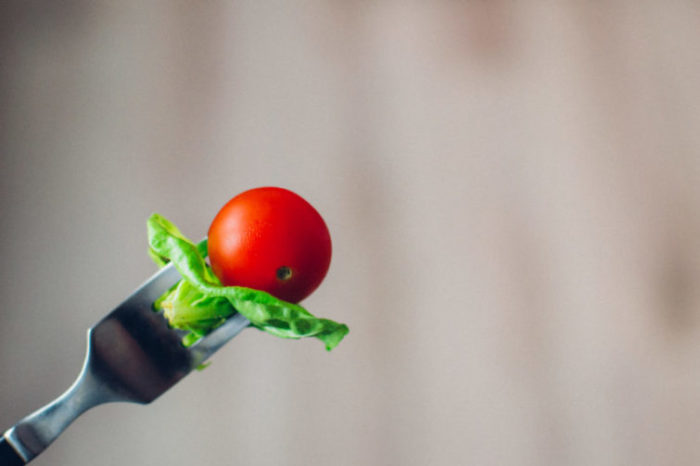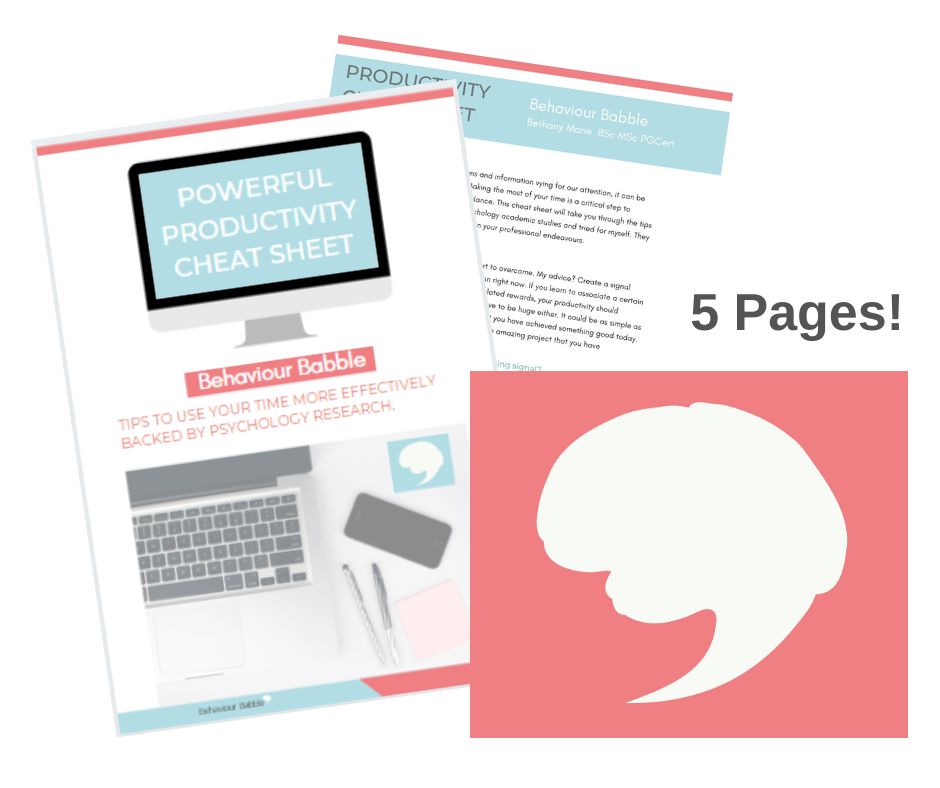Last updated on May 4th, 2017 at 06:53 pm
In a world where instant gratification is king, eating healthily can seem like an impossible task. Supermodel Kate Moss was famously quoted saying “Nothing tastes as good as skinny feels”. Clearly, this is not the case for everyone. Obesity rates in the Uk are at an all time high. And it is unlikely that the problem is due to a lack of education. The majority of people can differentiate between healthy and unhealthy foods, yet we still consistently make “bad” food choices (Anderson, Winett, Wojcik, Winett, & Bowden, 2001).
If you are anything like me, the long-term side effects of eating unhealthily can often seem too distant to scare me. Thinking about them doesn’t usually inspire me to make better food choices in that moment. For example, will that pizza taste good when I eat it? Hell yes! Could I gain weight if I continue to make these choices? Probably, but not for a long while yet (I like to think that metabolism can process most of what I throw at it!). And am I more likely to be at risk of health problems? Maybe, but in the future. Even then there is no guarantee that I will get one.
When the negative impact of your actions are uncertain and will only occur later in time, you are likely to continue to do the behaviour that provides instant gratification (see the PIC/NIC Analysis created by Dr. Aubrey Daniels and research by Porritt, M. 2008 for more information). It is understandable then, that we want to overcome this “instant pleasure now, worry about the consequences later” mentality. But can I stop myself from reaching for the biscuit tin?
Writing a food diary, keeping unhealthy foods out of the house and setting yourself small and achievable goals. These are all popular weight loss tactics. But you will have probably heard them all before. You may have tried these methods and they just haven’t worked for you. Or maybe they were just too impractical for you to follow through with. Not everyone has enough time to record everything that they eat!
Behavioural science has the answer. (Or at least, some very good suggestions! Clearly, the path to healthy eating is not a “one size fits all” approach. Otherwise, we would all be our ideal weight.)
If you are looking for a simple, effective and different way to eat more healthily, then read on!
Put Your Money Where your Mouth is
Let me ask you a question: If you had to pay £100 for every chocolate bar that you ate, would you start to eat less than you do now?
Everyone who(m) I put this question to answered with a resounding “Yes!” and this was including some pretty devoted chocoholics in the poll!. Unless you are lucky enough to have an unlimited disposable income, I would be willing to bet that the majority of the general population would eat more healthily if their cash was at stake.
What if I told you that you can voluntarily enter into a contract, whereby you commit to achieving a goal and set a financial penalty for not reaching your target. Simply put, if you don’t reach your goal within the agreed time-frame, you lose some of your money!
Does that sound crazy? It might indeed be a more drastic approach. Everything gets serious when cold hard cash is involved! But if you need a big dose of motivation to help you to reach your goals, then this might be just the concept that you need to try.
The 2 Apps That Could Help You
StickK
Behavioural economists from Yale University co-founded StickK, a web-based app built to help increase people’s chances of successful behaviour change. You pick a goal and commit to how much cash your willing to put at stake. Then, you can select a referee or supporters (friend or family member, though they can be anyone you like) who will verify your progress and help to cheer you on. If you reach your goal as expected, then that’s great! But if you miss the mark, then you will have to pay out at least $5 to the person or charity that you agreed to.
This approach has seen more than 300,000 contracts being created with eight hundred thousand workouts having been completed and thousands of cigarettes being left unsmoked.
+ The great thing about this app is that you can set any type of goal that you like. So you’re not restricted to just healthy eating and exercise goals if they aren’t your main concern. Want to become better at public speaking? This app can help. With so many weird and wonderful goals being created, the sky is the limit!
PACT
A similar, but just as the impressive app goes by the name of PACT. It still sees you committing cash towards your goals and tracking your progress. However, PACT specialises in helping people to either exercise more, log your daily food intake or to eat a certain amount of fruit/vegetables.
PACT is also a popular goal-setting platform, with over 6 million fruit/veggies eaten, 11 million workouts completed and a 92% goal success rate.
+This app is focused on two of the most prevalent health behaviours, exercising and healthy eating. You select your goal from pre-set categories, which takes less time than having to create your own goal from scratch. It is also easy to choose a goal that is specific to your health wants and needs. For these reasons, I can see why this app has become very popular.
+You can earn money! For each week that you reach your specific goal, such as working out 5 times a week, the app will pay you for being successful. The amount of money that you earn is quite small, my calculated average was around $1 a week. However, it is still nice to earn a little something extra for all of your effort.
-If you don’t meet your goal, the money that you lose will be distributed to other people who did reach their own goals. In this sense, the app is less customizable because you cannot choose to give to a certain person, charity or anticharity.
What is the behavioural science behind this approach?
The Avoidance Of Loss Contingency
A behavioural contingency can be described as a combination of “the occasion for a response, the response, and the outcome of the response” (Malott, 2008). A context, a response and a consequence. The monetary based incentive apps which I have just described operate using a specific type of contingency: avoidance of loss.
A study conducted by Salazar, & Noe (2015) utilised this type of contingency within their research. They explained that the avoidance of loss contingency is created when; you respond in a way which prevents you from losing a reinforcer (i.e. money!) and this results in the response being used more frequently in the future to avoid losing that reinforced again. In basic terms, this behavioural explanation confirms what you had probably guessed already. Apps like StickK and PACT work because we find the loss of money aversive and we want to avoid this at all costs!
Rule-Governed Behaviour
In this blog, I often talk about “reinforcement” and how this process has a direct impact on the way that we will behave in future situations. However, the causes of behaviour are, of course, not so straightforward. Reinforcement only acts upon the response that it followed immediately (Cooper, Heron, & Heward, 2007). For example, I eat pizza. The pizza tastes good. I’m more likely to eat pizza in the future in a similar context. When behaviour appears to be controlled by delayed outcomes (I will eat healthily now, to avoid losing my money tomorrow) this implies that the process of “rule-governed behaviour” is at work. Michael (2004, p. 36) explained that “{when the consequences seem to be delayed] the change is accomplished by virtue of the human’s complex social and verbal history, and should not be thought of as an instance of the simple strengthening of behavior by reinforcement”.
As human beings with an incredible ability to use language in sophisticated ways, following rules can be a useful tool which we often take for granted. For example, in the days when we were mere cavemen, initially, we had to learn via the direct contingencies. Touch fire and it burns your skin. Whereas, if your mum has said to you “Look before you cross the road, or you could be hit by a car”, you can follow this rule and avoid ever having to experience the painful real life contingency of not looking before you cross!
In this way, rules can help us to achieve our desired goals to eat more healthy. When you sign up to one the app’s I have mentioned, you are essentially agreeing to follow a rule. I.e “If I do not reach my goal of eating 5 fruit/veggies a day for a week, then I accept that I will lose £5. When you behave in a way to avoid the loss of a reinforcer (an indirect acting contingency), your behaviour is rule-governed.
Behavioural Contracts
A behavioural contract can be defined as “a document which specifies a contingent relationship between the completion of a specified behavior and access to, or delivery of, a specified reward” (Cooper, Heron, Heward, 2007, p. 551).
Why does this matter? Research has demonstrated that behavioural contracts can be used as an effective method in helping people to lose weight (Mann,1972). This could be yet another explanation as to why app’s like PACT are so successful.
Last Thoughts
Before I came across these apps, I had never considered using my hard earned cash as an incentive to live a healthier lifestyle. The biggest question that I faced whilst deciding whether to give these apps a try was “Why would I want to risk losing my money?”. And (though I’m at risk of sounding like a Loreal makeup advert!) ask yourself the following questions. Is my health worth it? Is my self-esteem worth it?
If the answer is yes, then maybe you should consider giving a monetary-based incentive app a try. One thing is for sure, I have already downloaded mine!
What do you think about these apps? Have they worked for you?
Please do let me know in the comments section below!
References
Anderson, E. S., Winett, R. A., Wojcik, J. R., Winett, S. G., & Bowden, T. (2001). A computerized social cognitive intervention for nutrition behavior: Direct and mediated effects on fat, fiber, fruits, and vegetables, self-efficacy, and outcome expectations among food shoppers. Annals Behavioral Medicine, 23, 88-100.
Cooper, J. O, Heron, T. E, & Heward, W. L. (2007). Applied behavior analysis (2nd ed.). Upper Saddle River, NJ: Pearson.
Malott, R. W. (2008). Principles of behavior (6th ed.). Upper Saddle River, NJ: Pearson Prentice Hall.
Mann, R. A. (1972). The behavior-therapeutic use of contingency contracting to control an adult behavior problem: Weight control. Journal of Applied Behavior Analysis, 5, 99-109. doi:10.1901/jaba.1972.5-99
Michael, J. (2004). Concepts and principles of behavior analysis (Rev. ed.). Kalamazoo, MI: Society of the Advancement of Behavior Analysis
Porritt, M. (2008). Translating the Science of Behavior Analysis to the Workplace: One Company’s 30 Year Effort. Revista Mexicana de Psicología, 25(1), 27-44.
Salazar, M., & Noe, I. (2015). Behavior Analysis Program to Improve Habits of Physical Activity, Eating, and Sleeping. Western Michigan University, Dissertations. Paper 743.
Image via Pexels
Beth is forever curious about what makes people tick. She is a master’s degree graduate and former psychology teacher (AKA a proud behaviour nerd!). Autism awareness is a cause close to her heart – check out her fundraiser. Beth becomes her happiest self when she’s helping people like you to enhance your life.
Join our community. Get ahead. Make the most of your time with our free guide!




